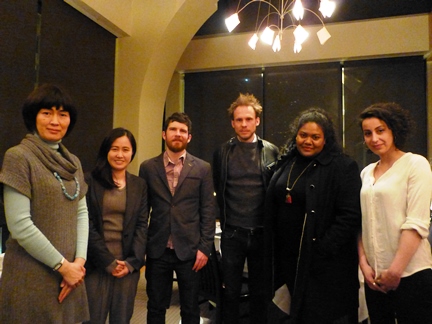
York University
March 31, 2016
March 31, 2016

March 23, 2016
By 19613
As media coverage of the 2016 US presidential election has shown, recent terrorist attacks and the ongoing influx of immigrants into Europe have caused an increase in xenophobia and related phenomena.
Eduardo Torre-Cantalapiedra, a Sylff fellow at El Colegio de México, used an SRA grant to research the impact on Mexican immigrants of the highly controversial anti-immigrant laws passed in Arizona in 2010. Can enforcing immigration laws decrease the number of undocumented immigrants? Should the living conditions of undocumented immigrants be ignored because their stay is illegal? This article reveals the true difficulties they face, as experienced by the immigrants themselves.
* * *
In recent years, Arizona has passed some of the harshest anti-immigrant policies in the United States. The Republican Party has adhered strictly to its doctrine of “attrition through enforcement,” and Democrats have done little to stop them. This policy has caused serious damage to Mexican families and to the population in general in that state, (My own estimates based on the American Community Survey suggest that there were approximately 248,000 Mexican households in Arizona in 2010). The doctrine is based on the idea of making everyday life for undocumented migrants so difficult that they will be motivated to go back to their countries of origin. In response to Arizona's anti-immigrant policies and the hostile environment they have generated, Mexican families have developed a set of strategies to make the difficulties more bearable. Some families have also decided to migrate from Arizona to other parts of the United States.
The fieldwork I carried out in Phoenix, Arizona, has allowed me to make a diagnosis of the situation. I now have a clearer idea of the problems that these anti-immigration policies have caused for Mexican families and for the social environment in Arizona. The main results of my fieldwork will be incorporated into the central chapters of my dissertation. My basic finding is that these state policies have not achieved the goal of making immigrants "without papers" leave the state. However, they have meant the systematic violation of civil rights of the migrant families. The police have been one of the largest sources of abuses and violations. US District Judge G. Murray Snow issued a sweeping decision finding that that Sheriff Joe Arpaio and his agency (Maricopa County Sheriff’s Office) had relied on racial profiling and illegal detentions to target Latinos during immigration sweeps and traffic stops (ACLU, 2015). Most of the people I interviewed told me they had been stopped while driving simply because of their skin color and physical appearance. Most had been subjected to heavy fines or had had their vehicles confiscated for a month. Several were subjected to deportation proceedings, even though they had never been convicted of any crime.
Undocumented migrant workers have also been pushed into the informal economy and have been forced to take increasingly precarious jobs. Manuel1 preferred to work as a day laborer rather than work without papers because he was afraid of being accused of identity theft if he used another person’s social security number. José was fired from the restaurant where he worked when the chef started to use the E-Verify system. (Arizona has required that most employers use the E-Verify system to verify the migration status of employees since 2007.) Because of this same system he could not find a new job in another restaurant. He now spends his time cleaning yards and does not earn enough money to support his family. Ramón spent two years unemployed, occasionally working small jobs for friends and acquaintances to get by.
In addition, family members are often afraid to contact the police to report crimes—even when they witness felonies, of which in many cases they are also victims. Marta's car was stolen in front of her house, but she never ventured to report the crime to the police. Manuel, an undocumented immigrant, was too afraid to go to the police to report an attempted rape of his daughter (still a minor) for fear that the police would ask about his immigration status. He was finally able to report the incident to the police with the support of a family member who is a US citizen.
The entire state has been affected by the implementation of the anti-immigrant policies. Underutilization of labor, strengthening of racist and xenophobic groups, the breakdown of the social fabric and severe economic losses are just some of the major problems that these policies against undocumented immigrants have caused.
Young people have also been affected by anti-immigrant policies. One law decided that undocumented immigrants must pay out-of-state tuition for their education. Some of the students I interviewed told me they were finding it very difficult to continue their studies because the tuition had increased by 300%. Others had already given up their studies. Only when President Barack Obama approved a new policy that deferred action for certain undocumented young people who came to the United States as children did some of them decide to continue their studies.
My study also documented the adaptation and mobility strategies that families have developed to deal with the anti-immigrant policies in Arizona. These strategies have included staying away form public spaces to avoid the risk of deportation, using members with some kind of legal status to attain certain benefits, seeking measures that allow them to circumvent the prohibitions on driving and working in the state, and others. María was so afraid of being deported and separated from her family that for many months she refused to leave her house except when it was absolutely necessary. Some families decided to emigrate from Arizona to other part of the United States. Some of those who had emigrated told me that enforcement of immigration laws by police in other states is different: they do not stop your car in the street simply because you look Latino. Interstate migration of foreign-born migrants is therefore not motivated only by social networks and economic issues. The varying immigration policies of different states provide another powerful incentive for some families to move.
To reverse these adverse effects, changes on two levels are necessary. The first step must be to get rid of all laws based on the doctrine of “attrition through enforcement.” The economic boycott, international and domestic pressure, protests against the unconstitutionality of these laws, and other measures, have been partially effective in fighting these laws in the medium and long term. While many local migration initiatives have been repealed, many remain in force today and continue to damage Mexican migrant families in the state. Second, the continuing daily struggle of families against the anti-immigrant policies is essential. Although this struggle stands a good chance of reversing the current policy framework in the long run, it is also needed as a means of empowering migrant families through information about their rights and participation in social movements and organizations that fight for the civil rights of migrants, regardless of their legal status in the United States. We must not forget that “undocumented” status does not mean that migrants have no rights according to United States laws. Among other constitutional rights, for example, an immigrant has the right to due process when he or she is arrested. An immigrant can be indemnified if he or she is a victim of a crime. Undocumented migrant children (K-12 or less) have the right to attend school according to the Supreme Court.
During my stay in Phoenix I had the opportunity to participate in activities organized by the Barrio Defense Committees (Comités de defensa del Barrio, or CDB for short). I was able to observe the important work being done by this and similar organizations in mitigating the adverse effects of the policies against migrants "without papers" and their families. CDBs are a genuinely grassroots movement that emerged in response to the attack against resident Mexican families represented by the 2010 Support Our Law Enforcement and Safe Neighborhoods Act, or Arizona SB 1070. The ongoing hard work of the CDB has allowed many Mexican families to move out of a position of isolated defense to take actions in defense of their rights along with other family units. As its members argue: Unity is strength ("la unión hace la fuerza").
In short, I am hopeful that the fieldwork I conducted with the support of Sylff Research Abroad will produce valuable information for policymaking in both Mexico and Arizona that will serve to defend the civil rights of Mexican families in Arizona and improve their living conditions, and to repair the broken social fabric by allowing closer links between Mexican and American families who live in the state.
References:
American Civil Liberties Union (March, 2015). Ortega Melendres, et al. V. Arpaio, et al. Retrieved from https://www.aclu.org/cases/ortega-melendres-et-al-v-arpaio-et-al
1Names have been changed to preserve the anonymity of the people interviewed.



March 18, 2016
The Tokyo Foundation is pleased to announce the 12 recipients of SRA awards in the second screening round for fiscal 2015. We received a large number of applications from fellows around the world, and the selection process was very competitive. All applications were carefully screened for eligibility, the feasibility of the proposal, and the relevance of the proposed research to the applicant’s academic pursuits. Congratulations to the winning applicants! We send you our best wishes and hope that the findings of your research abroad will further enrich and enhance your dissertation. The name of the awardees and their home and the host institutions can be viewed here.

March 16, 2016
By null
Four Sylff fellows from Chiang Mai University, Thailand—Pradhana Chantaruphan, Olarn Ongla, Saiwimon Worapan, and Alongkorn Jitnuku—jointly organized a field study to raise students’ awareness of environmental sustainability through community resource management. This coauthored article describes highlights of the field study and explains how collaboration among Sylff fellows helped to facilitate students’ learning.
* * *
On April 4-5, 2015, four Sylff fellows from Thailand organized an interactive activity in Pa Ngue village, Tanuer sub-district, Mae On district, Chiang Mai Province, Thailand.“Potential development for young leadership through participation in community resource management” was a joint project organized by Chiang Mai University and Silpakorn University. The idea of the project was to encourage students to become more aware of their potential as effective agents of change in society. Learning through real experiences helps students to understand their real potentiality.
Chiang Mai University collaborates with Silpakorn University in Bangkok to provide opportunities for students from both universities to work with villagers as a part of their efforts in community engagement. For students, community engagement serves as a real-world learning opportunity. Besides participating in activities related to their own areas of study, students must serve the needs of the community to help develop wider society and themselves as well. Becoming involved with the community in this way provides useful practice, training, and learning for students and encourages them to develop into active, responsible citizens.
After the university’s Sylff fellows group meeting in 2014, the four authors of this article felt strongly that there was a need for greater community engagement. It was this shared belief that made us decide to undertake a project together. Through our discussion of the strengths of our group, we thought of tapping into the community networks we have established through our various research and projects. We divided our work into several categories. Pradhana Chantaruphantook responsibility for coordination between the two universities as a faculty member of Silpakorn University, while the fieldwork sites were selected by Olarn Ongla based on his experience of research in this village.
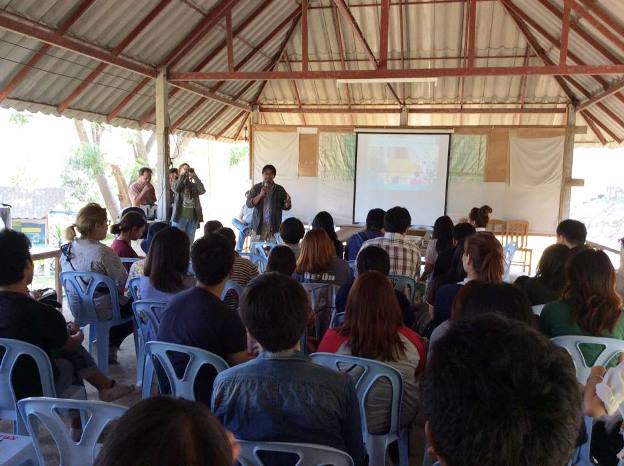 The story of Pa Ngue village illustrates how the process of forest management takes place in the community in response to external pressures that can include state policies and economic conditions. One thing that is peculiar to this village is the coexistence of different ethnic groups in the same area. These ethnic groups are the Karen and the so-called native or indigenous people. These consist of two groups: one group is a mixture of indigenous locals and Tai-lu from Mae-Sa-Puad village; the other is made up of indigenous people from the On-Klang sub-district. Together these ethnic groups search for ways to protect their local resources and develop strategies to deal with the state and bargain for autonomy. This is one of the things that make the village so attractive as a learning area for students. The students can see examples of conflict management among stakeholders and witness the development of ideas consistent with the historical and social circumstances. The Sylff fellows selected this area for the project based on these merits.
The story of Pa Ngue village illustrates how the process of forest management takes place in the community in response to external pressures that can include state policies and economic conditions. One thing that is peculiar to this village is the coexistence of different ethnic groups in the same area. These ethnic groups are the Karen and the so-called native or indigenous people. These consist of two groups: one group is a mixture of indigenous locals and Tai-lu from Mae-Sa-Puad village; the other is made up of indigenous people from the On-Klang sub-district. Together these ethnic groups search for ways to protect their local resources and develop strategies to deal with the state and bargain for autonomy. This is one of the things that make the village so attractive as a learning area for students. The students can see examples of conflict management among stakeholders and witness the development of ideas consistent with the historical and social circumstances. The Sylff fellows selected this area for the project based on these merits.
Three activities over two days provided students with opportunities to work with villagers. On the first day, students and villagers cooperated with pupils from the local school to construct a check dam. On the second day, students surveyed the area where the community lives and shared with villagers in a discussion on resource management, leading to an exchange of ideas between villagers and students. This project was devoted to improving the environmental sustainability of the community and to promoting leadership among students at the same time.
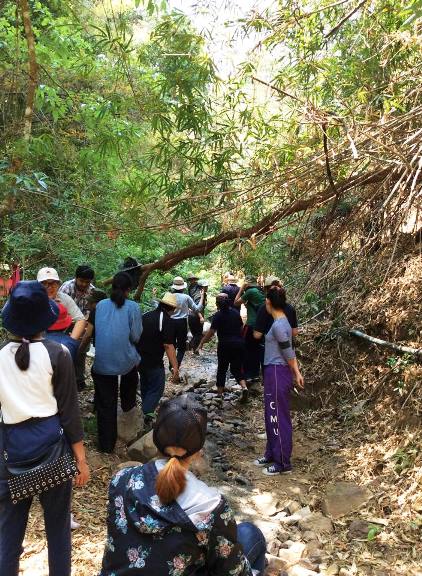
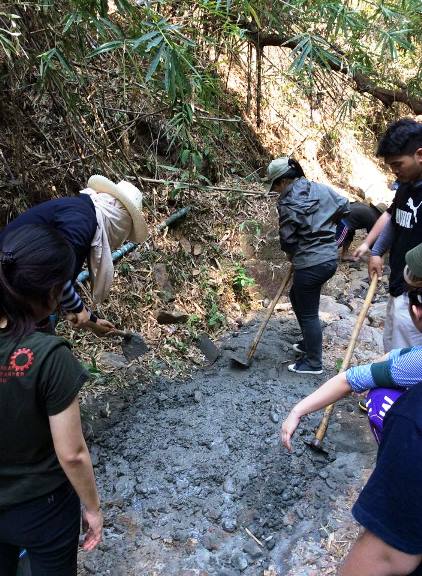 The schedule started with an introduction of participants and the community. Villagers told participants about their history and spoke about community development and the management of community resources. Later in the afternoon, students got to put their skills into practice in a real-world setting, working alongside villagers and local students on a resource management project by constructing the dam.
The schedule started with an introduction of participants and the community. Villagers told participants about their history and spoke about community development and the management of community resources. Later in the afternoon, students got to put their skills into practice in a real-world setting, working alongside villagers and local students on a resource management project by constructing the dam.
Check dams are made of a variety of materials. Because they are typically used as temporary structures, they are often made of cheap and readily accessible materials, such as rocks, gravel, logs, hay bales, and sandbags. Villagers usually cannot receive financial assistance from the government to construct check dams. They have to depend on their own resources, including manpower. Check dams are also limited in duration. These factors make students’ help relevant to the need of the villagers.
Check dams are a highly effective way of reducing flow velocities in channels and waterways. Compared to larger dams, check dams are faster to build and more cost-effective, being smaller in scope. This means that building a check dam will not typically displace people or communities. Nor will it destroy natural resources if proper care is taken in designing the dam. Moreover, the dams themselves are simple to construct and do not rely on advanced technologies. This means they can be easily used in more rural and less “developed” communities.
After dinner students shared their thoughts on the work of the community, their feelings on working alongside the villagers, and their ideas about young leadership.
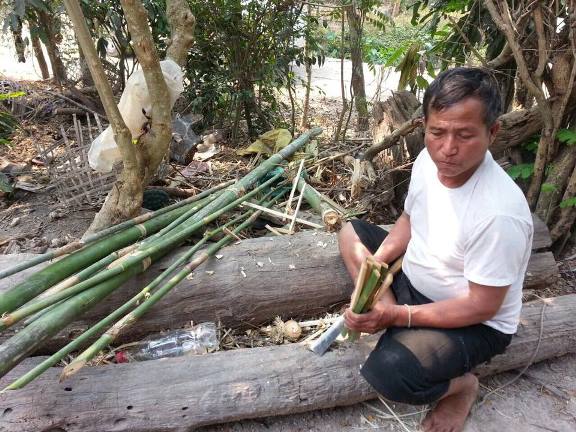
 The first activities got underway early in the morning, with the students separated into two groups. The first group carried out a survey on villagers’ working lives. Most of the villagers are farmers, producing corn on contract for the Thai Royal Project. Farming on contract with the Thai Royal Project brings many benefits, including useful information, access to raw materials, and experts who can give farmers advice. The contracts also guarantee farmers an income, giving them security and stability. This binds the village economy tightly with local resources, and brought home to us how important it is for the villagers to be able to manage the areas they use and share resources among the community in a sustainable way.
The first activities got underway early in the morning, with the students separated into two groups. The first group carried out a survey on villagers’ working lives. Most of the villagers are farmers, producing corn on contract for the Thai Royal Project. Farming on contract with the Thai Royal Project brings many benefits, including useful information, access to raw materials, and experts who can give farmers advice. The contracts also guarantee farmers an income, giving them security and stability. This binds the village economy tightly with local resources, and brought home to us how important it is for the villagers to be able to manage the areas they use and share resources among the community in a sustainable way.
The second group conducted a survey on water management. The geography of the village is mountainous, and ensuring a steady supply of water is no easy task. Villagers have constructed a water supply system by themselves.
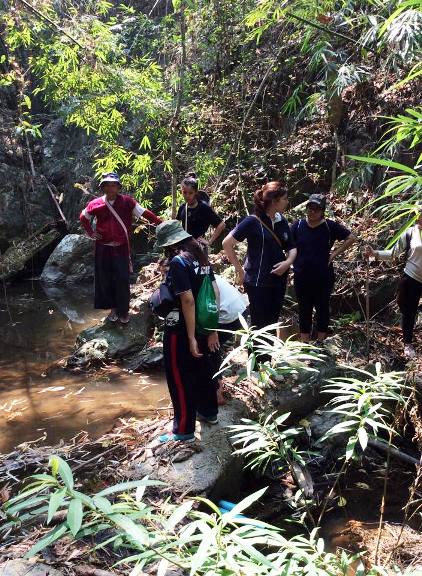
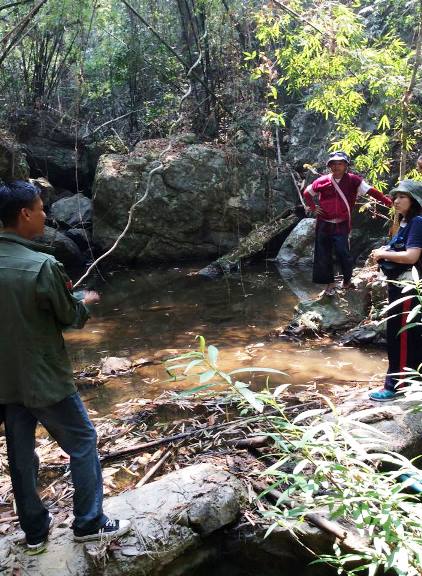 The group walked into the forest to survey the headwater. The villagers told legends about ancestor worship and the animist beliefs that the members of community act out in rituals that pay respect to the local spirits. Nature is therefore something that protects the villagers and their way of life. These traditional beliefs also help to encourage the community to use the water and other resources of the forest with respect. Animists beliefs make it less likely that people will take advantage of one other and help to instill a spirit of coexistence in the community.
The group walked into the forest to survey the headwater. The villagers told legends about ancestor worship and the animist beliefs that the members of community act out in rituals that pay respect to the local spirits. Nature is therefore something that protects the villagers and their way of life. These traditional beliefs also help to encourage the community to use the water and other resources of the forest with respect. Animists beliefs make it less likely that people will take advantage of one other and help to instill a spirit of coexistence in the community.
After the students had explored the community, they compiled the data and knowledge they had gained from the course. They shared with friends in the group and passed on these findings to other friends in the separate group who carried out their surveys in a different area. At the same time they exchanged ideas with the villagers about activities in the area and doubts arising from their experiences in the field. In this way, the students were able to learn from one another, and this helped to evoke an atmosphere of enthusiasm. Through the course, participating students came to understand that community resources need to be appropriately managed and that activities of all kinds can act as a bridge to new knowledge, whether the activity involves learning from storytelling, taking part in the everyday activities of villagers, learning about resource management strategies, or taking part in discussions after the activities are over.
(1) Effects on the Community
The community will be strengthened in the management of resources already available. Participation in this activity helped to generate confidence and a sense of pride that will empower the community to put their tacit knowledge into use. The project also served as a reminder that the knowledge of the community has been handed down from generation to generation. Owing to the university’s support, helping communities in this way earns them greater bargaining power with the state. By strengthening academic networks, it also helps to give confidence to youth leadership in the village.
(2) Effects on Sylff Fellows
This project had a positive impact for the fellows from its very outset, involving as it did collaboration between fellows from three disciplines (anthropology, economics, and political science). The project served as a useful reminder of the importance of working with local communities in order to understand the social and cultural phenomena that led us to pursue these careers in the first place. In addition, a joint project of this nature reflects the interdisciplinary work and exchange of ideas between fellows with knowledge in three different fields, each with something to contribute to the project. Political science is relevant to the idea of resource management and the community’s bargaining power vis-à-vis the state, while anthropology covers concepts of culture and beliefs in collective consciousness and community benefit, and economics helps to understand the wealth accruing to the community through resource management. All of this has helped to expand fellows’ understanding and is an example of interdisciplinary work.
(3) Effects on Participating Students
Involving students from different universities and different fields, the project successfully enabled the exchange of knowledge between disciplines and interdisciplinary work among fellows. The project also raised students’ awareness of several important issues, including the struggle between state control and community autonomy and the efforts being made to protect shared resources despite ethnic differences. Witnessing the way that events unfold within the community was in itself a lesson in diversity. By exchanging this newly acquired knowledge with fellow students laid down a basis for applying these insights to other social phenomenon. It is to be hoped that this taste of hands-on learning outside the classroom will help to foster an open and constructive mindset among the young generation.
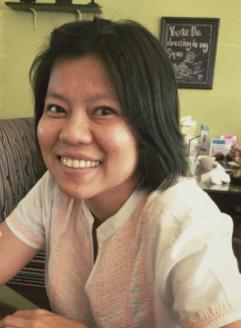
Pradhana ChantaruphanReceived a Sylff Fellowship in 2013 at Chiang Mai University, Thailand, while conducting her PhD studies in anthropology. She is a lecturer in the Department of Anthropology, Faculty of Archeology, at Silpakorn University in Bangkok.
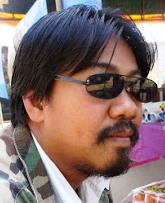
Olarn OnglaReceived a Sylff Fellowship in 2013.Completed a master’s degree in Political Science at the Faculty of Political Science and Public Administration, Chiang Mai University.
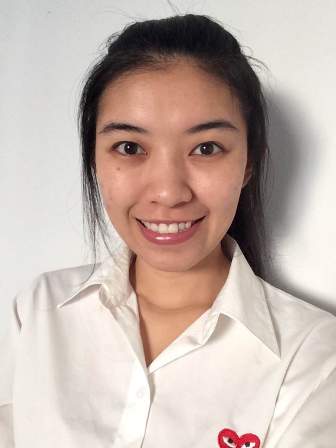
Sasiwimon WorapanReceived a Sylff Fellowship in 2013. A master’s student in the economics program at Chiang Mai University, Thailand. Areas of interest include business economics, international economics, and the uses of economic theory and quantitative methods to analyze problems. Her thesis is titled “Impact of Remittances on Economic Growth in ASEAN Countries.”


March 10, 2016

March 7, 2016
By 19622
Guy Hoskins, a Sylff fellow at York University, traveled to Brazil to study the implications of a new civil law on Internet freedoms with huge implications for privacy, freedom of expression, and network neutrality for Internet users around the world.
* * *
When the revelations made by former US government contractor Edward Snowden emerged regarding his country’s practice of dragnet surveillance of global digital communications, the repercussions were manifold. Some of the consequences, such as diplomatic tensions and a heightened public awareness of data privacy issues, could have been foreseen. Others, however, were much less predictable. One such outlier was the passing into law in Brazil of a bill called the Marco Civil da Internet (the Civil Framework for the Internet) enshrining a substantive set of civil rights for the country’s more than 100 million Internet users, built upon the three pillars of privacy, freedom of expression, and network neutrality. Having been subject to abandoned votes on 29 separate occasions in the country’s lower chamber, the success of this partially crowdsourced, multi-stakeholder policy document was far from assured. The public and executive outrage generated by news of the National Security Agency’s practice of intercepting sensitive Brazilian communications proved to be the tipping point. President Dilma Rousseff signed the bill into law on April 24, 2014.1
Within a global media environment marked by almost daily stories of government infiltration of digital communications, threats against the neutrality of the Internet by telecommunications companies seeking to impose a tiered system, and state and corporate suffocation of freedom of expression online, it is little wonder that a bill of online civil rights in one of the most populous countries on earth should attract the interest of the world. That story, at least for English-speaking audiences, has yet to be fully told. It is the purpose of my doctoral dissertation to address that shortfall. By undertaking a detailed analysis of the development of this world-first bill of rights for Internet users, my hope is that a viable framework can be developed for other countries to follow and to safeguard an Internet legislated according to civic logic. It is not enough to hold aloft the bill itself and point only to the provisions contained therein. In isolation they cannot provide a cogent and replicable model for the rest of the world if the means of their resolution are not properly chronicled and understood.
With an undergraduate degree in Latin American studies, fluency in Portuguese, and experience living and working in the region, I had always attempted to integrate developments in Latin America into my graduate research in communication studies. So when I first read reports about the Marco Civil at the outset of my doctoral studies, it was immediately clear that this would make an excellent object of study. I first traveled to Brazil in March 2014 on a preliminary fact-finding mission while the Marco Civil was still in development. I had the immense good fortune not only to establish a network of contacts among civil society organizations that were promoting the bill but also to be granted access to the Brazilian Congress on the evening of March 25, 2014, to bear witness to the historic successful vote.
Buoyed by these experiences, and with financial assistance from SRA, I planned a period of formal field research in Brazil to coincide with the one-year anniversary of that first vote in March 2015. My primary objective was to interview some of the main protagonists who had participated in the open contribution phase of the bill’s development initiated by the Ministry of Justice. These people represented some of the major stakeholders in the Brazilian Internet, including telecommunications corporations, government bureaucrats, members of Congress, civil society leaders, traditional media companies, and web service companies. In gathering firsthand testimony from these individuals, I sought to discover how different groups of social actors were guided by particular logics with regard to the future direction of the Internet—profit, state security, surveillance, civic engagement, innovation, etc.—and how these were tied to the social values of privacy, freedom of expression, and economic freedom that ultimately form the technical and legal operating environment of a national Internet.
Network neutrality has received much media and public attention in recent months as the subject of major regulatory decisions in the United States, India, and the European Union, as well as of course in Brazil. It was fascinating to observe how what might appear at first glance to be a rather arcane technical premise—that all the data that flows on the Internet must be treated equally without any attempt by network administrators to allow data from certain sources to travel faster than any other—was articulated and interpreted by the different stakeholders in the Marco Civil case.
Traditional media companies, dominated in Brazil by the ubiquitous Globo Group, saw net neutrality as a means to ensure mass access to their commercial content. Web companies interpreted it as a safeguard for innovative new online services. Telecommunications companies opposed it on the grounds that it would stifle the potential for new business models. Civil society organizations generally viewed the legislation as essential to both consumers’ rights to digital services and citizens’ rights to freedom of knowledge. Identifying and charting these diverse interpretations of one element of the technical architecture of the Internet can allow us to better understand why these details are so fiercely contested and to appreciate the deeply social process that underpins these apparently neutral technological considerations.
Another essential facet of the Marco Civil process that I was able to appreciate much better after speaking with my interviewees was the way in which the object of the policymaking process—the Internet itself—had influenced how the various groups were able to “operationalize” their agendas or logics. The Brazilian government’s use of an online consultation forum opened the bill to large-scale public scrutiny and input. This made the legislative project much more democratically legitimate—a fact that helped considerably to overcome partisan opposition in Congress. Civil society groups took advantage of the same mechanism to raise public awareness of the substantive issues under discussion while the telecommunications companies, with no little irony, were the group most disadvantaged by the transparency and ready coalition-building facilitated by the Internet and continued to pursue their traditional tactics of backroom lobbying rather than exposing rational arguments to the oxygen of (online) publicity.
I am now in the early phases of data analysis as I translate, transcribe, and codify the hours of interview footage I gathered during my fieldwork in Brazil. As I work, I seek the insights that will allow me to portray as accurately as possible how, in spite of a concentration of forces applying logics of profit and control online, “another Internet is possible” (Franklin, 20132)—one premised on safeguarding freedom of expression, data privacy, and network neutrality.
1http://www.newscientist.com/article/dn25467-brazils-internet-gets-groundbreaking-bill-of-rights.html
2Franklin, M.I. (2013) Digital Dilemmas: Power, Resistance and the Internet, Oxford: Oxford University Press.



March 2, 2016
Six outstanding students at the National and Kapodistrian University of Athens were awarded Sylff fellowships under the New Sylff Fellowship Program in February 2016 (see details of the new program ). Athens was the second university to successfully switch to the new scheme.

Sylff fellows, from left to right: Maria Kyritsi, Anna Ventouratou, Nikolaos Galanopoulos, Vasiliki Gkeka, Evangelia Chaldaiaki, and Emilia Savva.
The Sylff program at Athens has been energized under the new financial scheme. The six latest fellows not only have excellent academic credentials but have also demonstrated strong leadership in their research and social activities, both locally and internationally. The Tokyo Foundation is visiting the university in April, and we are looking forward to learning more about their activities.
We wish them a great success in their graduate studies and their careers.

From left to right: Despina Karvela (Sylff program executive), Loukas Spanos (SSC member and Sylff alumnus), Professor Costas Dimitracopoulos (SSC member), Maria Kyritsi (Sylff fellow), Vasiliki Gkeka (Sylff fellow), Anna Ventouratou (Sylff fellow), Vice Rector Konstantinos Buraselis (SSC Chairman), Emilia Savva (Sylff fellow), Professor Andreas Helmis (SSC member), Evangelia Chaldaiaki (Sylff fellow), Professor Stavros Thomadakis (SSC member), and Nikolaos Galanopoulos (Sylff fellow).

February 25, 2016
By 19675
Ágnes Szunomár, a 2015 Sylff fellow at the Hungarian Academy of Sciences, summarizes her research on the recent trend of Chinese investment in Central and Eastern Europe. In her article, she describes how it differs from investments by other Asian and European countries.
* * *
Chinese outward foreign direct investment (OFDI) is one of the most spectacular developments in recent international economics in terms of its rapid growth, geographical range, and takeovers of established Western brands. Chinese firms mainly invest in Asia, Latin America, and Africa, where they search for markets and natural resources. They have also been active in the developed economies of Western Europe and the United States, however, that offer markets for Chinese products and assets that Chinese firms lack, such as advanced technologies, managerial knowledge, and distribution networks. Chinese firms are also increasingly investing in Central and Eastern European countries (CEECs). These investments are quite a new phenomenon and still constitute a small share of China’s total foreign direct investment (FDI) in Europe (10%), but since 2006 we have seen a growing influx of Chinese investments into the region, which is expected to increase further in the future (see the figure below). 
The aim of my research was to analyse the motivations and location determinants of Chinese FDI in the largest recipient countries within the CEECs, with a special focus on the role and impact of host country macroeconomic and institutional factors.
China’s rise is often compared to the postwar “Asian Miracle” of its neighbors. An analysis of the internationalization experiences of Japanese, Korean, and Chinese companies reveals several common features as well as some differences. One of the main common characteristics shared by all three is the creation and support of the so-called national champions, that is, domestically based companies that have become leading competitors in the global market. In fact, during their developmental period, both the Japanese and Korean governments gave strong state financial support to their companies in order to protect and promote them as well as to strengthen them for international competition. China has followed this example in subsidizing domestic industries and supporting their overseas activities, for example in the form of government funding for OFDI. 
Although the CEECs differ in many respects, they do have some features in common as possible locations for East Asian investors. Their economies have been in the process of catching up over the last decades, defined mainly by European powers. FDI has played a key role in their restructuring. Investment from East Asian countries in the CEECs began as early as the 1990s (with a Japanese Suzuki factory in Hungary). 
In the past decade most of these countries became increasingly interested in boosting trade and attracting investments from East Asian economies. The global economic and financial crisis of 2008 intensified these ambitions. The largest recipient countries of East Asian investments within the CEECs are Hungary, Poland, the Czech Republic, and Slovakia. Around 90% of foreign investments in the four countries are from Europe, with an average of only 7.4% of FDI from other countries, mainly from the USA, South Korea, Japan, and China.
Typically, the international literature examines the motivations of Chinese OFDI on a global basis, and most previous studies have focused on China's growing investments in the developing world. Studies dealing with the characteristics and motivations of Chinese FDI in Europe rarely deal with the Central and Eastern European region. Although significant research has been done on FDI flows to the CEEC region, most of these studies do not include Chinese investments. The literature is thus incomplete, and detailed description and analysis of this issue is lacking. The primary aim of this research was therefore to complement the literature.
Besides complementing the literature, my results also have an inherent message for CEEC corporate decision makers and policy makers. For the CEECs, the Chinese relationship is increasingly a priority, especially since the economic and financial crisis of 2008. Most countries in the region see a closer relationship with emerging economies such as China as a promising way of recovering from the recession. The further development of corporate or government strategies in this regard may be supported by the results of this research.
Given the broad concept and geographical scope of Central and Eastern Europe, instead of focusing on the relations of all the region’s countries with the main East Asian investors, the research concentrates on a fair sample of CEEC countries: the Czech Republic, Hungary, Poland, and Slovakia. These countries were selected in consideration of their size, reflecting their proximity, growing business ties, and geographic location, as well as their political and economic relations with China. The Czech Republic, Hungary, Poland, and Slovakia are the most developed and most important players in the CEEC region and are members of the Visegrad Group as well as the EU and the Schengen Area.
At the beginning of the research I reviewed theories and literature on FDI location determinants with a special focus on FDI determinants in the CEECs. The next step was to analyze the changing patterns and motivations of Chinese and other East Asian OFDI as I tried to find similarities and differences between the characteristics and motivations of Chinese, Japanese, and South Korean FDI in the CEECs. In addition, I provided a detailed description of the impact of both macroeconomic and institutional factors based on case studies and interviews with East Asian firms established in the CEECs.
To continue this research in the near future I also prepared an online opinion survey on East Asian companies' investment patterns, which will be sent out to several Chinese, Japanese, and South Korean companies operating in the CEECs to collect more information on their activities, motivations, and strategies.
My investigation into the motivations of Chinese OFDI in the CEECs shows that Chinese investors mostly search for markets (market-seeking investment). Investors are attracted by the relatively low labor costs, skilled workforce, and market potential. EU membership allows Chinese investors to avoid trade barriers, and the countries serve as an assembly base due to the relatively low labor costs (efficiency-seeking investment). However, in parallel with the increasing number of mergers and acquisitions in the region, strategic asset-seeking motives have become more important for Chinese companies in recent years. Chinese investments are also motivated by the search for brands, new technologies, or market niches that they can fill in European markets. For example, in early 2012 Liugong Machinerys acquired Huta Stalowa Wola’s construction equipment division and its distribution subsidiary, Dressta. Secondly, in 2013 China’s Tri Ring Group Corporation acquired Polish Fabryka Łożysk Tocznych (the biggest Chinese investment in Poland so far), a producer of bearings for the automotive sector.
Chinese investment has flowed mostly into manufacturing (assembly), but over time services has attracted more and more investment as well. For example Hungary and Poland are home to branches of the Bank of China and the Industrial and Commercial Bank of China, as well as offices of some of the largest law offices in China (Yingke Law Firm and Dacheng Law Offices). Regarding the Chinese entry mode, there are examples of greenfield or quasi-greenfield investments (Huawei, ZTE, Lenovo), as well as mergers and acquisitions (Wanhua) and joint ventures (Orient Solar, BBCA).
Having examined the CEEC-East Asian economic ties, my conclusion is that while Japan and South Korea previously had larger roles, China has increasingly come to the fore in recent years. Analyzing the difference in motivations before and after the global economic and financial crisis suggests that although the crisis did not have a direct impact on East Asian investments in the CEECs, there was an indirect impact since it was in the aftermath of the crisis that the CEECs started to search for new opportunities to help them recover from the recession. For example, Hungary's “Opening to the East” policy was initiated after (and partly as a result of) the crisis, but the crisis also made Poland look eastward. China took these opportunities and has increased sectoral representation of Chinese firms in the CEECs in recent years.
The results of my research suggest that the characteristics, motivations, and location determinants of Chinese investments in the CEECs differ somewhat from Western as well as other East Asian investors’ motivations. While macroeconomic factors, such as labour costs, market size, and corporate taxes, had and continue to have a decisive role in selecting FDI locations for investors from other countries, Chinese firms seem to attach greater importance to institutional factors. Country-level institutional factors that impact Chinese companies’ location choice within the CEECs seem to be the size of the ethnic Chinese population, as well as investment, privatization and public procurement opportunities, but also good political relations between the host country and China. One example is Hisense’s explanation of the decision to invest in Hungary. Besides traditional economic factors, this decision was apparently motivated by the “good diplomatic, economic, trade, and educational relations with China, the sizable local Chinese population, Chinese trade and commercial networks, and associations already formed.” Another example is the Nuctech company, which established its subsidiary in Poland in 2004 and participated in public procurement.
My research also suggests that the CEEC region is not homogeneous and that there are differences in the economic relations between the CEEC countries and China. Moreover, the CEECs often view each other as competitors rather than working together to achieve shared goals (that is, to attract more Chinese investment). This is unfortunate, since according to the literature on the perceptions of the CEEC region among Chinese, many Chinese business investors consider the region to be a unified bloc.
To conclude, I found that:
(1) The role of Chinese investments within the CEE region increased significantly after the crisis, and investment from China will be increasingly important for the countries of the region in the future, as the Chinese share of total inward FDI in the CEECs increases.
(2) Chinese investments in the CEECs differ somewhat from other countries’ investments in the region in terms of motives, which in the Chinese case are driven by both political and economic factors.
(3) The level and warmth of political relations with the host country have an increasingly important influence on Chinese companies’ investments in the region. And (4) the CEE region tends to be seen more as a unified block than as a group of countries by the Chinese. Greater cooperation among the CEECs might therefore help to increase the chances for successful economic relations with China.



February 18, 2016
By 19676
Network analysis has emerged as a key technique in many fields of study, including economics, geography, history, and sociology. One fundamental concept that researchers try to capture is centrality: a quantitative measure revealing the importance of nodes in the network. The values assigned to the nodes are expected to provide a ranking which identifies the most important vertices. Naturally, the word “importance” has a wide range of meanings, leading to many different definitions of centrality. László Csató, a Sylff fellow at Corvinus University of Budapest in Hungary, is exploring the methodological background of some centrality indices.
* * *
In the analysis of complex social and economic structures, actors and the relationships among them are often interpreted as a network. The topology of the network can provide insight into its characteristics and functioning independently from the chosen system (a group of people, a supply chain, international trade relations). The graph-theoretical approach offers a possible approach to modelling these networks. Its strengths lie in the measurement of structural attributes as well as in visualization.
A well-known concept of the graph-theoretic analysis is centrality, which reflects the relative importance of the nodes in the whole network. Many methods exist for this purpose, although not every metric is suitable for every network – the choice depends on the nature of processes in the network and the aims of the analysis.
Most centrality measures have an interpretation on the network graph. However, their axiomatic background deserves more attention: little is known about which measures are excluded and which are supported by accepting a plausible property. The adopted approach is a standard path in (cooperative) game and social choice theory, and is gradually coming to prominence in economics, illustrated by the Nobel Memorial Prize in Economic Sciences awarded to Alvin E. Roth and Lloyd S. Shapley in 2012. It can significantly contribute to the effort to find the right measures for a network.
Since my research has a strong theoretical orientation, I want to illustrate it through an example. Readers interested in the details can consult two working papers by me on the topic.1,2
This paper attempts to develop an index for measuring the accessibility of nodes in networks where each link has a value such that a smaller number is preferred. Examples might include distance, cost, or travel time. In the following, we will give some insight into the results.
The Marshall Islands in eastern Micronesia are divided into two atoll chains, one of which is Ralik. Figure 1 shows a (simplified) graph of the voyaging network among the 12 islands of the Ralik chain (Ailinglaplap, Bikini, Ebon, Jaluit, Kwajalein, Lae, Lib, Namorik, Namu, Rongelap, Ujae, Wotho). The links between the nodes show the possible routes of inter-island journeys by canoe. For example, it is not feasible to directly travel from Bikini to Jaluit: this journey requires at least five inter-island hops through Rongelap, Kwajalein, Namu and Ailinglaplap. We can therefore say that the distance between Bikini and Jaluit is 5. The problem is to provide a numerical answer to the question “How accessible is a node from other nodes in the Ralik chain?” The islands should be ranked with respect to the probability that they might become the centre of the chain.
An obvious solution is distance sum, the sum of the distances to all the other nodes. For example, Ailinglaplap has a distance sum of 25 since its distance to Bikini is 4, to Ebon 2, to Jaluit 1, and so on. The distance sum is characterized by three independent properties (axioms) such that it satisfies all of them, but any other accessibility index violates at least one property. The three conditions are as follows:
The distance sum focuses exclusively on the shortest paths. Sometimes this is not a desirable feature, as these paths can be vulnerable to link disruptions. Therefore a generalized distance sum, a parametric family of accessibility indices, is suggested. It is linear (easy to calculate), considers the accessibility of vertices besides their distances, and depends on a parameter in order to control its deviation from distance sum. This means that it should violate one axiom of the characterization above, which turns out to be the independence of distance distribution. However, the generalized distance sum is anonymous and satisfies dominance preservation if its parameter meets an appropriate condition.
Figure 2 shows the generalized distance sums for some nodes (on the vertical axis) as a function of a parameter (on the horizontal axis), which measures the influence of the other (i.e., not the shortest) paths. If the parameter is zero, the generalized distance sum is equal to the distance sum, however, some changes can be observed by increasing the value of the parameter:
Kwajalein (with a distance sum of 20) and Namu (21) are the first and second nodes in the accessibility ranking for any value of the parameter. Ebon (34) is “obviously” the least accessible node. These nodes are not shown in Figure 2.
To summarize, the generalized distance sum seems to reflect the vulnerability of accessibility to a disruption on the edge between Ailinglaplap and Namu: if this occurs, then the islands of Ailinglaplap, Ebon, Jaluit, and Namorik suffer more as they have a smaller “internal” network. The parameter can be said to measure this danger to a certain extent.
Accessibility measures can be used in a number of interesting ways:
Network analysis has emerged as a key technique in modern sociology as well as in anthropology, biology, economics, geography, history, and political science. My methodological research aspires to support these applications to get an insight into different networks. I believe robust mathematical foundations are crucial to a better understanding of similar complex systems.
1Csató, L. (2015): Measuring centrality by a generalization of degree. Corvinus Economics Working Papers 2/2015. URL: http://unipub.lib.uni-corvinus.hu/1846/ This paper contributes to network analysis, dealing with the issue of how to identify key nodes in a network. For this purpose a new centrality measure, called the generalized degree, is suggested, based on the idea that a link to a more interconnected node is preferable to a connection to a less central one.
2Csató, L. (2015): Distance-based accessibility indices. Corvinus Economics Working Papers 12/2015.URL: http://unipub.lib.uni-corvinus.hu/1986/


February 16, 2016